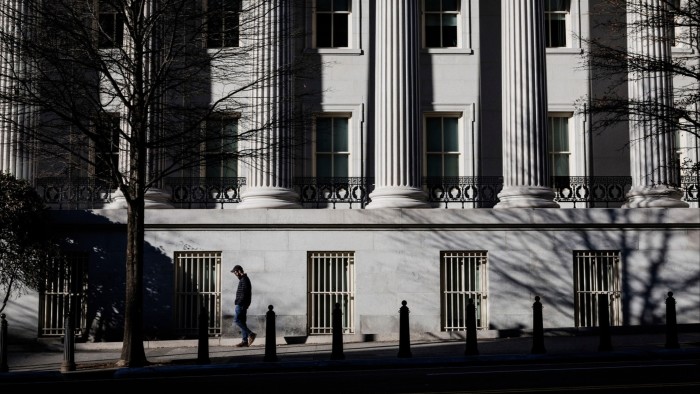Unlock the White House Watch newsletter for free
Your guide to what Trump’s second term means for Washington, business and the world
Big investors say they are diversifying their bond portfolios to include greater exposure to markets outside the US as Donald Trump’s trade war and the country’s growing deficit erode the appeal of the world’s biggest debt market.
US debt markets have been hit in recent days by the president’s “big, beautiful” tax bill, which was passed by the House of Representatives on Thursday and threatens to sharply increase the country’s public debt.
The rising concerns over the level of government borrowing follow wild swings for Treasuries during the fallout from Trump’s tariff blitz last month, when US debt failed to play its traditional role as a refuge from market stress.
“The US is no longer the ultimate and only perceived safe haven,” said Vincent Mortier, chief investment officer at Amundi, Europe’s largest asset manager. “The country has become the home of extreme fiscal undiscipline.”
Investment chiefs stressed that the dollar would remain the world’s reserve currency for the foreseeable future and Treasuries would maintain their role as a central component of bond portfolios.
However, they added that the recent turmoil sparked by Trump’s trade war and his “liberation day” tariffs on April 2 had underscored the benefits of international allocation, particularly while many regions’ debt markets were suddenly generating strong returns.
“Our client base is looking at their allocations, and they’re feeling heavily overweight dollar assets relative to where they’ve been historically,” said Bob Michele, chief investment officer and head of global fixed income at JPMorgan Asset Management.
“They’re concerned now about all things in the US, the impact of tariffs, the size of the budget deficit and the federal deficit and on and on and on. Why not use that opportunity to diversify into other markets?”
Long-dated US government bonds sold off sharply in the run-up to the passage of Trump’s tax bill, extending a multi-day decline after a weak Treasury auction highlighted intensifying fears over America’s fiscal trajectory. The 30-year yield climbed above 5.1 per cent on Thursday, its highest level since late 2023, reflecting a sharp drop in price.
The dollar, meanwhile, has dropped 8 per cent this year against six major peers.
“The dollar is the story,” said Lindsay Rosner, head of multisector investing at Goldman Sachs Asset Management. “It is hard to find an equivalently liquid, deep rule-of-law market” but “the impact on the dollar has been meaningful. There is weakness in the dollar that has some permanence. There is power in diversification outside the US.”
Bond fund giant Pimco’s management team told the Financial Times earlier in May that it was “prudent” to “look for other high-quality markets to diversify into” amid heightened recession risks caused by Trump’s tariffs.
Investors particularly highlighted the appeal of European bond markets, along with Japanese and Australian debt, all of which were offering strong yields together with increasingly upbeat economic narratives.
“I would say there’s an acceleration in interest in looking outside of US markets at non-dollar assets, particularly now where you get a considerable amount of yield in Europe,” said Michele, who observed that a “new core is developing” in the region.
“Historically, everyone had looked at Germany and France.” But “because there’s concern about fiscal expansion there, we’re now looking at what 15 years ago were considered the peripheral borrower: Italy and Spain”.
Concerns over US public finances have dominated the conversation in the market in recent days, as Congress moves ahead with a bill that would extend Trump’s 2017 tax cuts. Independent analysts say the legislation would markedly increase annual deficits and the country’s debt burden.
“The US will most probably maintain a budget deficit of between 6 and 7 per cent of GDP,” said Amundi’s Mortier. “That is a lot by any standard and will result in more refinancing needs . . . so more supply of Treasuries to the market.
“Can demand follow? Yes, but many buyers will request higher yields.”
Henry McVey, head of global macro and asset allocation at private capital firm KKR, said in a report this week that “liberation day”, when Trump launched his global trade war, had “been a catalyst for engaging in serious conversations with global investors and their boards about diversifying beyond the US capital markets.
“When the US [earlier this year] experienced the trifecta of a weaker dollar, falling equities and rising rates, it set off risk alarm bells that forced everyone from sovereign wealth funds to family offices to not only de-risk but also to look for ways to reduce their overweights to US assets.”
McVey suggested that “the traditional role of US government bonds may diminish due to the country’s fiscal deficit and high leverage”.
https://www.ft.com/content/47267a76-feb1-46a7-97af-0c1584d20b45


